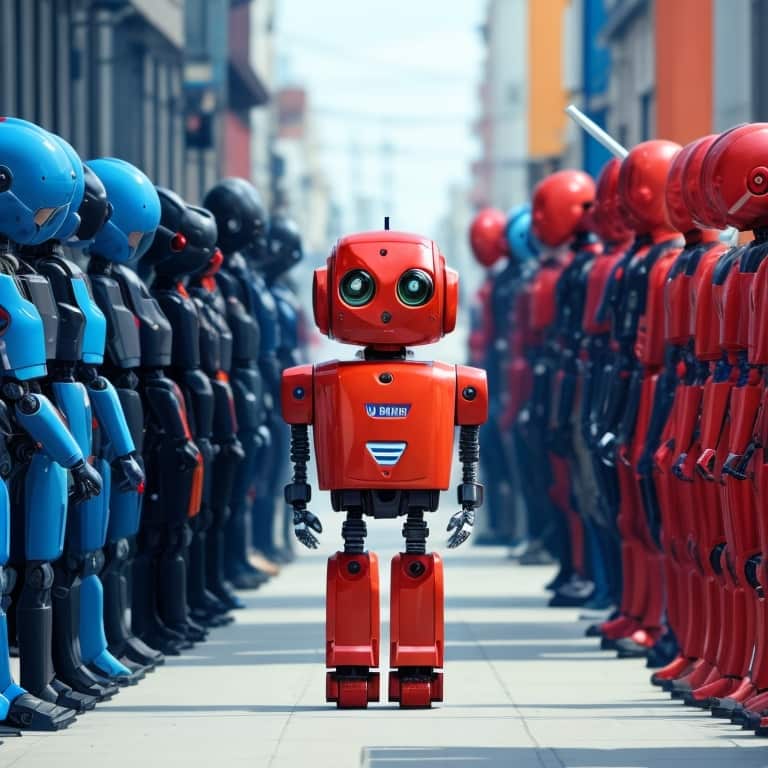
 In the modern era of technology, businesses are always looking for ways to differentiate themselves from competitors and make a lasting impact on their target audience. One of the most effective strategies for achieving this is by creating unique and compelling content. In this article, we will explore the importance of unique content for your business and dive into why Originality.AI is a great tool to review the uniqueness of your content.
In the modern era of technology, businesses are always looking for ways to differentiate themselves from competitors and make a lasting impact on their target audience. One of the most effective strategies for achieving this is by creating unique and compelling content. In this article, we will explore the importance of unique content for your business and dive into why Originality.AI is a great tool to review the uniqueness of your content.
The Power of Unique Content
An effective AI content automation and distribution strategy can create and manage content much faster and more effectively. However, AI-generated text is not a solid replacement for genuine, human-created content. A machine cannot empathize with the audience or create the type of truly original content that search engines love. Therefore, it is important to use AI content tools like Originality.AI to ensure that the content produced is original and unique.
What is Originality.AI?
Originality.AI is an AI content and plagiarism detection tool. It’s designed to help bloggers, professors, and businesses detect artificially generated content quickly and effectively. It is designed to ensure that the text is original, is sufficiently free from AI, and does not contain any instances of plagiarism.
Originality.AI is the most accurate AI content detector on the market and is the only tool that accurately identifies a piece of AI-generated content.
It is built by a team of content marketing and GPT-3 AI experts that deeply understand the needs of serious web publishers. Originality.AI features include:
- AI writing detection
- Plagiarism checking tools
- Full site scan
- Unlimited team members
Originality.AI is less expensive than other outdated but does way more in helping publishers verify their content is unique.
Throughout this article, we will explore the various ways in which unique content can benefit your business and how Originality.AI can be a valuable asset in your content creation strategy. From boosting your search engine optimization (SEO) to creating long-term brand awareness, using Originality.AI can help you achieve website marketing success.
Sign up for Originality.AI ⇒ ⇒ ⇒

Who built Originality.AI?
Originality.AI is built by a team of content marketing and GPT-3 AI experts with deep understanding of the needs of serious web publishers.
Jon Gillham, the founder, came up with the idea to detect whether the content is written by humans or AI tools. He launched Originality.AI after selling a content marketing agency he had previously founded.
Originality.AI launched in November 2022 to be able to detect GPT-3 generated content (before ChatGPT had launched). Having been one of the earliest adopters of generative AI content for SEO purposes at scale through his agency, Gillham understood the wave that was coming which Chat GPT and GPT-4 have fully unleashed.
The team has also developed a free Google Chrome extension that allows users to visualize the entire creation process of a Google Document.
How does Originality.AI detect AI-generated content?
Originality.AI is an AI content detection tool that uses OpenAI’s GPT-3.5 model to thoroughly scan any text content for originality by comparing it against public sources on the web, ensuring that all writing is yours. The tool is specially designed for online publishers and assists them in ensuring that their work is original, unique, plagiarism-free, human-written content, and not by AI tools like ChatGPT.
Originality.AI is an easy-to-setup and user-friendly tool that does not require any technical knowledge. It offers various advanced and valuable features that help detect the uniqueness or accuracy of content, such as team management, auto-renewal, and scan history by user. Originality.AI can detect AI-generated content by comparing it against public sources on the web and determining if it was produced with the help of AI. When you input text, the tool comes up with a confidence score of both human and AI percentages. A higher AI score means the content is probably generated using AI tools.

Benefits of Unique Content Generation with Originality AI
Originality.ai can help publishers boost SEO, increase traffic, enhance engagement, and build brand authority. Using Originality.AI help publishers verify that the content is unique, not plagiarized, and not generated using AI tools. This helps maintain high-quality content, improve search engine rankings, and avoid potential Google penalties for using AI-generated content.
| Benefit | Description |
|---|---|
| Accurate AI detection | Originality.AI is the most accurate AI content detector on the market, detecting all major types of AI-generated contenthttps://nikolaroza.com/originality-ai-review/. |
| Plagiarism detection | Allows you to check the uniqueness of text by comparing it against public-facing web content while running it through an AI checkerhttps://goldpenguin.org/blog/originality-ai-review/. |
| Unique content | Helps ensure that the text is original and free from AI, which is important for SEO as plagiarized content lacks relevancy and authenticity, leading to lower SEO rankingshttps://inkforall.com/copy-editing/plagiarism-checker/plagiarism-and-seo/. |
| Cost-effective | Less expensive than many outdated plagiarism checking tools, and it allows you to add unlimited team members, unlimited websites, and complete unlimited scans checking for both plagiarism and if AI writing tools are suspected to have been usedhttps://originality.ai/. |
| GPT-4 | The first and only current content detection tool on the market that makes use of GPT-4, OpenAI’s newest AI language modelhttps://goldpenguin.org/blog/originality-ai-review/. |
| Positive learning environment | Helps create a culture of honesty and fairness in your classroom and foster a positive learning environment for all your studentshttps://goldpenguin.org/blog/originality-ai-review/. |
How Does Originality.ai Compare to other Ai Detection and Plagiarism Tools?
| Tool | Description | Features | Pricing |
|---|---|---|---|
| Originality.AI | The most accurate AI content detector and plagiarism checker built for serious content publishers | Team management, full site scan (coming soon), auto-billing, scan history by user, AI writing detection tool, GPT-4 AI language model | $0.01 per credit, 1 credit scans 100 words |
| Writer | Offers a free detector that works on up to 1,500 characters and requires API access for more | Free detector, API access | Free for up to 1,500 characters, API access pricing varies |
| CopyLeaks | A top choice for plagiarism detection in the content editing industry that has expanded their capabilities in AI content detection | Plagiarism detection, AI content detection | Starting from $150 per month |
| ContentAtScale | Offers AI detection accuracies with a free add-on | AI detection | Free add-on, primary services starting from $150 per month |
| Grammarly | A popular AI-powered writing assistant that includes a plagiarism checker | Plagiarism checker, writing assistant | Free version, premium version starting from $11.66 per month |
| QuillBot | A paraphrasing tool that uses AI to rewrite text | Paraphrasing tool, AI-powered | Free version, premium version starting from $4.95 per month |
| Copyscape | A plagiarism checker that compares your content to billions of web pages | Plagiarism checker | Starting from $0.03 per search |
| Plagiarism Checker X | A plagiarism checker that can detect plagiarism in more than 60 languages | Plagiarism checker | Free version, professional version starting from $39.95 per year |
| Turnitin | A plagiarism checker that is widely used by educational institutions | Plagiarism checker | Pricing varies depending on the institution |
How Does Human Generated Content Compare to AI Generated Content?
Unique content is original, distinctive, and tailored to your business, setting you apart from competitors. It captures the interest of your target audience and search engines, improving your SEO rankings and driving organic traffic to your website without paid advertising.
| Factor | Human-Generated Content | AI-Generated Content |
|---|---|---|
| Creativity | High level of creativity and originality | May lack creativity and originality |
| Understanding and nuance | Can capture nuances of local languages and maintain a specific tone | Tends to contain keywords and may lack the nuances of local languages |
| Speed and scalability | May take longer to produce, but can be more nuanced and engaging | Faster and more scalable, but may lack the complexity and value of human-written content |
| Cost-effectiveness | May be more expensive due to the need for manual writing/typing, publishing, etc. | More cost-effective due to the ability to produce a vast amount of content quickly |
| Personalization | Can be tailored to specific clients and audiences | Can be personalized to some extent, but lacks the human touch |
| Authenticity | High level of authenticity and originality | May not always be original or unique enough to pass copyright tests |
| SEO and keyword optimization | May not always be optimized for SEO and keyword usage | Tends to contain keywords and can be optimized for SEO and keyword usage |
| Quality | High-quality and engaging content | May lack the complexity and value of human-written content |
Advantages of using human-generated content
- Creativity and Originality: Unlike AI algorithms, People can create unique and imaginative content by thinking creatively. They don’t have to stick to predefined patterns or rely solely on data-driven analysis to do so.
- Emotional Connection: People often connect better with content that humans create because it can be more emotional and personal. People can add feelings like empathy, humor, or storytelling to what they create, and this can make a stronger connection with people who read, watch, or use it.
- Contextual Understanding: Humans are really good at understanding difficult things like different meanings, context, and small cultural references. They can make things just right for different groups of people, taking into account things like what they like, what might offend them, and how they talk. This is hard for computers to do as well as people.
- Critical Thinking and Adaptability: People have the ability to think critically and adjust their content according to feedback, changing circumstances, or unexpected situations. They can respond to new trends, include current events, and change their content strategy accordingly.
- Subject Matter Expertise: Content creators often focus on specific areas, bringing extensive knowledge and expertise to their work. They can offer detailed analysis, expert opinions, and useful insights that might require a lot of experience and knowledge.
- Authenticity and Voice: Content created by humans has a unique style and honesty that people connect with. People can add their personality, personal stories, and different perspectives into their work, making it easier to relate to.
- Ethical Decision-Making: People can make good choices about what to create and how to create it, even when dealing with difficult topics. They can make sure that their work follows ethical rules and respects what society thinks is right.
- Adaptability to New Challenges: People can learn to deal with new challenges, trends, or unexpected situations when they create content. They can try new things, experiment with different formats, and find creative ways to solve problems.
- Trust and Credibility: Creating content that is made by humans can help build trust and credibility with people. Humans can create strong relationships, build personal brands, and create loyalty based on their knowledge and reputation. This is something that AI-generated content may not be able to do as well.
- Human Touch and Empathy: People can help others by sharing content that shows they understand and care about their feelings. They can talk about difficult experiences, make others feel better, and give advice. This works because they use their own emotions to connect with others in a meaningful way.
Disadvantages of using human generated content
- Time and Resource Intensive: Creating content made by humans can take up a lot of time and resources. It needs people who can write, design, or create to put in a lot of work and spend a good amount of time to make content that’s really good.
- Inconsistency in Quality: Creating content is different for everyone, and it can be hard to make all the content look and sound the same when different people make it. This is especially hard when you have to make a lot of content.
- Subjectivity and Bias: People have personal opinions and biases that can affect what they create. Sometimes their cultural, political, or personal beliefs can show up in what they create, which can affect how true and believable it is.
- Limited Scalability: Scaling the production of content created by humans can be tough and expensive. As the demands for content increase, it becomes harder to keep a consistent level of output without spending more money on hiring more creators or expanding resources.
- Human Error and Mistakes: People often make mistakes when they create content. Even if they check it carefully, they can still make mistakes that might make the content less good.
- Dependence on Human Availability: Content production depends on people being available and productive. If content creators are not available due to illness, holidays, or other reasons, it can delay content delivery and make it less consistent.
- Limited Data Analysis and Insights: AI systems can analyze data better than humans. Humans may find it hard to understand big data or find hidden patterns, which could limit their analysis and content strategies.
- High Costs: Hiring good content creators and keeping a team can be expensive. Companies may need to spend lots of money on salaries, benefits, training, and ongoing development for their content teams.
- Adaptability to Rapid Changes: In industries that change quickly or fast-paced environments, content created by people may not always keep up with the latest trends and updates. People who create content may need to spend time researching, understanding, and adding new information or changes to their content.
- Limited Multilingual or Multicultural Expertise: Creating content for different audiences or languages can be hard for people who don’t know all the languages or cultures. This can make it difficult to share content with everyone or in different places.
Advantages of using AI-generated content
- Efficiency: AI can generate content at a rapid pace, reducing the time and effort required for content creation. It can process vast amounts of data quickly, resulting in faster turnaround times and increased productivity.
- Cost-effectiveness: Once trained, AI models can generate content at a lower cost compared to hiring human content creators. It eliminates the need for ongoing salaries, benefits, and training expenses associated with human resources.
- Consistency: AI-generated content ensures a consistent quality and style across multiple pieces. It follows predefined rules and guidelines, minimizing variations that can occur with human-generated content.
- Scalability: AI-generated content can be easily scaled to meet growing demands. AI systems can handle large volumes of content without experiencing fatigue, making it efficient for businesses with high content requirements.
- Data-driven Insights: AI can analyze vast amounts of data to identify patterns, preferences, and trends. It can generate content that is tailored to specific target audiences based on data insights, resulting in more targeted and effective content strategies.
- Language and Cultural Adaptability: AI can generate content in multiple languages and adapt to different cultural contexts. This allows businesses to reach global audiences and create localized content more efficiently.
- Personalization: AI algorithms can analyze user data and behavior to deliver personalized content recommendations. This level of personalization can enhance user experiences and engagement, leading to improved customer satisfaction and loyalty.
- Continuous Improvement: AI models can learn from user feedback and adapt their content generation based on evolving needs and preferences. Through iterative training and refinement, AI-generated content can continually improve over time.
- Automation of Repetitive Tasks: AI can automate repetitive and mundane content creation tasks, freeing up human content creators to focus on more strategic and creative aspects of their work. This increases overall productivity and allows for a more efficient use of human resources.
- Exploring New Possibilities: AI-generated content can explore new ideas, formats, and approaches that may not have been previously considered. It can provide fresh perspectives, generate novel concepts, and inspire human content creators to think outside the box.
Disadvantages of using AI-generated content
- Lack of Creativity and Originality: AI-generated content is not as creative, original, or innovative as content generated by humans. This is because AI operates on predefined rules and patterns, which limits its ability to create unique and groundbreaking content.
- Limited Emotional Connection: Content generated by AI often lacks the emotional depth, personal touch, and human connection of content generated by humans. It may have difficulty expressing complex emotions, humor, or empathy in an authentic and relatable way.
- Inability to Grasp Contextual Nuances: AI may have difficulty understanding cultural references or subtle language cues, resulting in mistakes, misinterpretations, or insensitive content that may not be appropriate for the intended audience or cultural context.
- Potential for Biased Outputs: AI models are trained on biased data, which can lead to discriminatory outcomes if not monitored and managed carefully.
- Lack of Critical Thinking and Adaptability: AI systems cannot think critically or adapt to new challenges. They operate based on predefined algorithms, and may struggle to adjust their content strategy in real-time or navigate complex decision-making processes.
- Limited Subject Matter Expertise: AI may not have the same level of knowledge, expertise, and experience as human content creators. In fields that require careful analysis, content generated by AI may not offer complete or accurate information.
- Impersonal and Generic Tone: AI-generated content can sometimes sound formulaic or generic, lacking the personal touch, storytelling, and unique voice that humans can bring. This can make it less interesting or engaging than content created by humans.
- Ethical and Legal Considerations: AI-generated content can cause ethical and legal issues, especially with plagiarism, copyright, and intellectual property. People are responsible for making sure it follows the rules and is ethical.
- Lack of Flexibility in Unpredictable Situations: AI systems may have difficulty adjusting to unexpected or quickly changing situations. They may not be able to change quickly enough to handle unpredictable circumstances or address new issues as they arise.
- Potential for Misinterpretation or Inaccurate Information: AI-generated content needs high-quality and accurate training data. If the data is incomplete or flawed, the AI system may generate content with errors, misinformation, or misinterpretations.
How Does Originality.ai Compare to Other Ai Detection Tools?
Originality.AI:
- $0.01 per credit, 1 credit scans 100 words
- 50: 5,000 credits for $0.50.
- $100: 10,000 credits
- Unlimited team members, unlimited websites, and complete unlimited scans checking for both plagiarism and if AI writing tools are suspected to have been used
Writer:
- Free detector for up to 1,500 characters, API access pricing varies
CopyLeaks:
- Starting from $150 per month
Plagiarism Checker X:
- Free version, professional version starting from $39.95 per year
Turnitin:
- Pricing varies depending on the institution
Other plagiarism checking tools:
- Prices can range from $10.99 per month for 100 pages and range up to a customized plan for large sites
- Most solutions charge either a monthly or annual fee. Prices can range from $100 or more per month for over 100K pages and millions of words
Resources for Unique Content Generation
- HubSpot’s Blog Topic Generator: This tool can help you come up with unique blog post ideas based on your keywords.
- Grammarly: A tool that helps you write clear, mistake-free, and impactful content.
- Hemingway App: This application makes your writing bold and clear by highlighting lengthy, complex sentences and common errors.
- Portent’s Content Idea Generator: This tool generates catchy titles for your next blog post or content piece.
- BuzzSumo: This tool helps you discover high-performing content so you can get more likes, links, and shares.
- CoSchedule’s Headline Analyzer: This tool analyzes headlines and titles and provides feedback on length, word choice, grammar, and keyword search volume.
- Canva: A graphic design platform that allows users to create social media graphics, presentations, posters, and other visual content.
- Google Trends: This tool allows you to see the latest trends, data, and visualizations from Google and find out what’s trending near you right now.
Originality.ai FAQs
What is Originality.AI?
Originality.AI is an AI content and plagiarism detection tool built for serious content publishers. It is designed to detect duplicate content and artificially generated text accurately.
How accurate is Originality.AI?
Originality.AI is the most accurate AI content detector on the market, detecting all major types of AI-generated content. It is 99% accurate on GPT-4, 83% accurate on ChatGPT, and 95% accurate on AI-generated and paraphrased content using Quillbot. It is also about 3X more accurate than any competitor.
What are the unique features of Originality.AI?
Originality.AI includes features like team management, full site scan (coming soon), auto-billing, scan history by user, and an AI writing detection tool. It also allows you to add unlimited team members, unlimited websites, and complete unlimited scans checking for both plagiarism and if AI writing tools are suspected to have been used.
What are the benefits of Unique Content Generation with Originality AI?
Using Originality.AI can help protect your reputation and improve your content quality by accurately detecting duplicate content and artificially generated text. It is also less expensive than many outdated plagiarism checking tools and uses the latest AI technology to provide accurate detection of AI-generated content.
How much does Originality.AI cost?
Originality.AI’s pricing is that you buy credits to use it. It costs at least $0.01 per credit, and 1 credit scans 100 words.
Is there a free trial for Originality.AI?
At the moment, there is no free trial for Originality.AI.
What is the pricing model for Originality.AI?
Originality.AI’s pricing model is that you buy credits to use it. It costs at least $0.01 per credit, and 1 credit scans 100 words.
Final Thoughts
Unique content is crucial for businesses as it helps them to stand out and succeed in content marketing. To achieve this, focus on creating original content, optimizing it for search engines, and using paid campaigns. Building relationships and trust with your audience is possible through consistent delivery of valuable and engaging content, which establishes your brand identity.
Consistency, tone, and visual branding also play a vital role in achieving long-term brand recognition. Engage your audience through storytelling and emotions to create memorable experiences that cement your brand. By reusing your content in different formats and places, you can reach more people and have a greater impact. Lastly, measuring, analyzing, and adjusting your content strategy based on data-driven insights is crucial for refining and improving your content.
In summary, unique content is essential for success in content marketing, and by focusing on originality, optimization, and value, businesses can increase their brand’s visibility, engagement, and long-term success.

